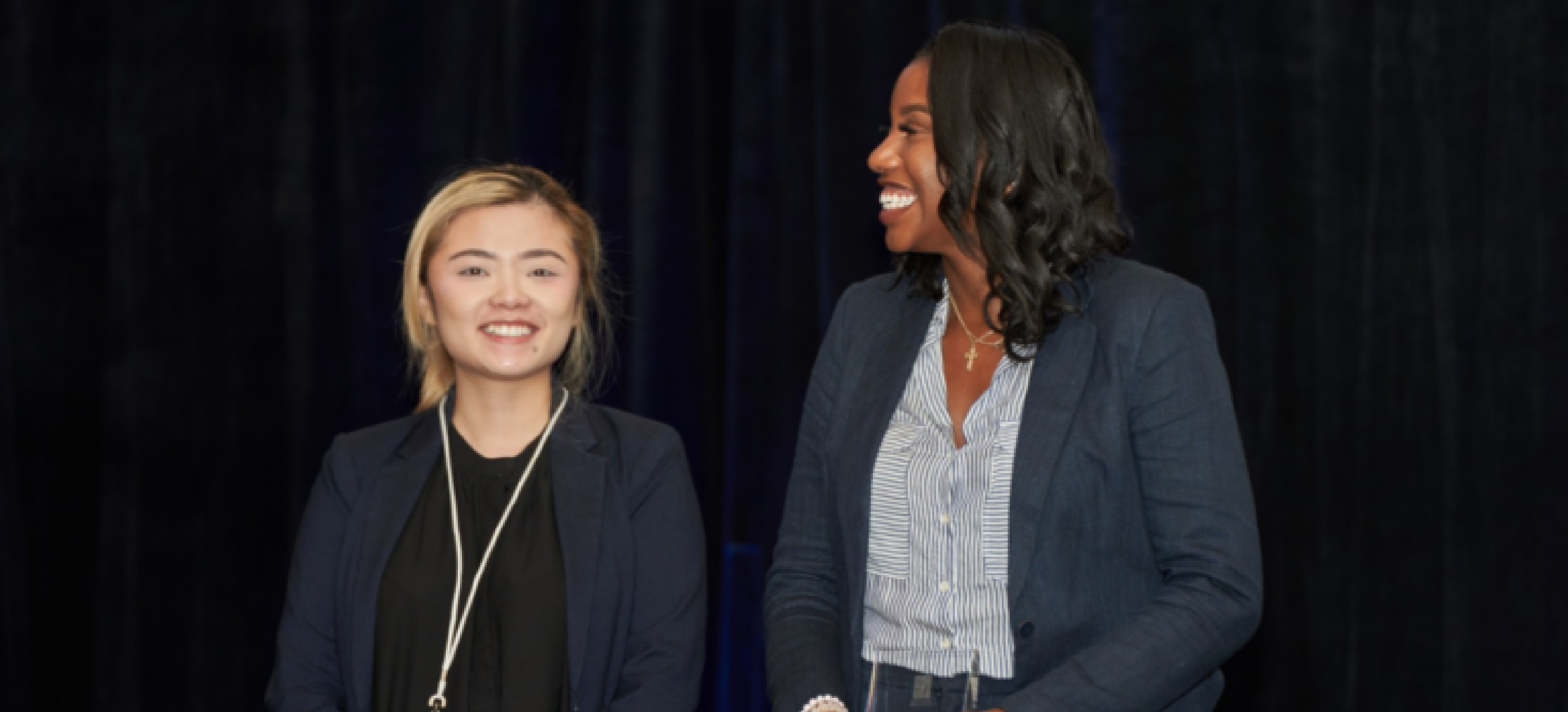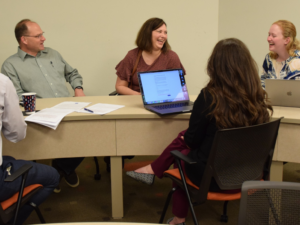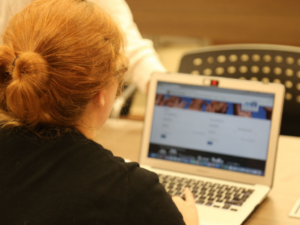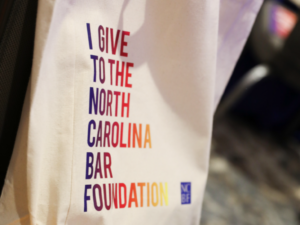More than a Step Forward, the Open Door Fellowship Program is a Huge Stride
 The Open Door Fund was established to engage legal organizations, law firms, and individuals across the state in supporting the Open Door Fellowship Program.
The Open Door Fund was established to engage legal organizations, law firms, and individuals across the state in supporting the Open Door Fellowship Program.
In June of 2022 the NCBF Board of Directors voted unanimously to adopt an additional core value affirming the Foundation’s commitment to diversity, equity and inclusion. Less than a year later, an Open Door Fund was established to engage legal organizations, law firms, and individuals across the state in supporting the Open Door Fellowship Program.
The program officially commenced this past summer, as 1L law students Tavaria Smith and Zi Zhou became the first to be honored as Open Door Fellows, and to assume roles in an immersive internship. More than a summer job, this program was designed to provide invaluable connections and networking opportunities, along with the type of practical and social experiences that might not have been available otherwise.
“I was moved by the outpouring of support for establishing the Open Door Fund,” said Clayton Morgan, 2022-23 President of NCBA and NCBF, “as well as our ability to quickly come together to create a program that is a manifestation of how we will evolve.”
The collaborative effort that resulted in the launch of the Open Door Program was driven by a Fellowship committee that included representatives from the Board of Directors and a cross section of committee leaders from: Women in the Profession, Minorities in the Profession, the Sexual Orientation and Gender Identity Committee, among others.
Patti Ramseur, President of the NCBA and NCBF, reflects on how the swift action that resulted in the program’s launch is an excellent illustration of how well the Bar Association and the Foundation work together. “The program is also a missing piece in our long-standing commitment to civic education, as we are not only adding to the spectrum of what we can offer, but we are extending opportunity to students beyond our traditional reach.”
“This flagship program is a bold statement of how we are going to tackle the issue of under-representation of diversity in our ranks,” said Clayton. “While we need to shine a light on what has happened historically, we need to also take action that will put us on more solid ground for the future.”
The Future is Now
“While it was important to act swiftly, it was also critical to act with intention,” said Patti. “We raised enough funds to support two paid interns this year, and the plan is to continue to fundraise and invite more participation in the future. At the same time, we want to make sure that the program is sustainable, and that the Open Door experience has a lasting impact on the students involved, as well as on the organizations that employ them.”
Leveraging the Power of Association
Twenty six applicants came forward last spring after Clayton and Fellowship committee members, visited all six North Carolina law schools. Patti underscored how important it will be going forward to have the entire Association focused on creating experiences for Fellows, as well as garnering input from those going through the program.
Both Clayton and Patti envision committees offering guidance on practice management, business development, networking and more. Attendance at the annual meeting will also be an ongoing part of the learning experience for future fellows. “It’s important that we are accessible,” said Clayton, “and that fellows can see how the President runs a Board meeting, how decisions are made. They need to know we are available to them now, and as their careers progress.”
Let the Connections Begin
From the application review process through the matching of prospective fellows with summer employers, the program was designed to cultivate deep and meaningful connections. To screen applicants, each Open Door committee member worked independently in a tool designed to rate and score the applications. The rating was followed by a full day of discussion which narrowed the 26 applicants to five participants, who then went on to interview with six potential employers. Every finalist had the chance to interview with every employer, and each employer screened each finalist before final selections and matches were made.
“All of the students that we had to choose from were excellent,” said Susan Brooks, former Associate Director with the North Carolina Innocence Commission, one of this year’s employer participants. “The Foundation and the Association did so much work on the back end to streamline the process that our job was made easier. We loved the reciprocity of the interview process and were delighted that Tavaria chose to work with us.”
Zi, who was ultimately paired with Dayatra Matthews, Senior Vice President, Legal and Compliance at Local Government Federal Credit Union, also spoke favorably about the interview process and the outcome. She felt she was able to shine because of all the support and encouragement. “I was so impressed with how much time was spent with me personally,” she added. And according to Dayatra, when she first met Zi she knew that she wanted to work with her.”She is a potential superstar and I’m happy she chose us!”
Open Door Fellow Spotlight: Tavaria Smith
When Tavaria stood up in front of peers in a Peer Court Review program back in high school, something just clicked. While every aptitude and career test she had taken up until that point directed her to the law, it was the embodied experience of standing up for peers and serving her community that drove the message home.
From high school in Athens, Georgia, to NC Central School of Law, Tavaria has been guided by a spirit of generosity and a desire to be a role model for her three younger siblings. She says she grew up poor, but never felt deprived. After college, her desire to be a role model found her working as a college advisor to kids at the same high school where she started out.
Tavaria admits that her first year at NC Central School of Law was harder than she anticipated. That said, she is buoyed by her connections to other students and her strong support network, which of course includes family. When Clayton called to tell her she had been selected as an Open Door Fellow she had to keep herself from jumping up and down. “I was so grateful for the opportunity and so happy that I literally cried tears of joy.”
Open Door Fellow Spotlight: Zi Zhou
“Since becoming an Open Door Fellow, I feel like I’m living a dream,” said Zi. Initially she admits being a bit overwhelmed by the Fellowship interview process, but she also felt tremendous relief. “I can be myself and everyone seems to welcome that,” she said through a smile.
Zi remembers that there was one question on the application that gave her pause. When she was asked to reflect on how she had overcome obstacles in her life, she said she needed to spin the answer a bit. She doesn’t see her upbringing as an obstacle she overcame, but rather an experience that informed and motivated her direction in life. A first generation immigrant from Hunan, China, she came to the US at age 8, only speaking Mandarin. Raised by a single Mom who speaks very little English, Zi said having the agency to protect her Mom, and to make a difference in people’s lives is what drew her to the law.
“At first, my law school studies didn’t seem clearly connected to how I might use my degree to do good,” said Zi. But after interacting with people through the Fellowship on-boarding process, she said that connection became clearer. While she acknowledges financial security is important to her, meaningful work and a way to give back are vital.
Dayatra Matthews Speaks Out on the Importance of the Open Door Program
“This is personal for me” says Dayatra Matthews, “and my company has been gracious enough to take on my personal mission.” Dayatra recounts her early experiences with the NCBA Minorities in the Profession Committee, and how connections she made through MIP propelled her forward. However, with still only 4% of the US attorney population being black and female, there is still a lot of work needed to bring diversity into our ranks, comments Dayatra.
Why did she sign the Local Government Federal Credit Union up as an employee sponsor, before she even knew the details of the program? “I am wholly committed to providing opportunities to the historically under-served. When I signed on I knew we would get good work from talented, motivated people, but that would just be the icing on the cake. We are looking to launch people in their careers and to create the type of interpersonal, day to day experiential engagement that will help them succeed.”
This article is part of the 2023 Impact Series. Access the 2023 Impact webpage.


